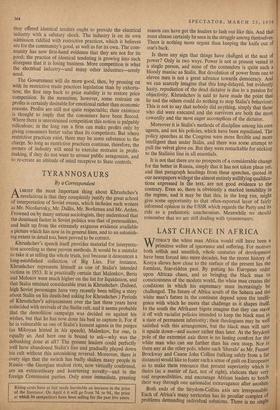A LMOST the most important thing about Khrushchev's revelations is that
they completely justify the great school of interpretation of Soviet events, which includes such writers as Mr. Nicolaevsky, Mr. Dallin, Mr. Borkenau and Mr. Arden. Frowned on by many serious sociologists, they understood that the dominant factor in Soviet politics was that of personalities, and built up from the extremely exiguous evidence available a picture which has now in its general lines, and to an astonish- ing extent in detail too, been proved to be correct.
Khrushchev's speech itself provides material for interpreta- tion according to these proven methods. It would be a mistake to take it as telling the whole truth, just because it denounces a long-established collection of Big Lies. For instance, Khrushchev represents himself as one of Stalin's intended victims in 1953. It is practically certain that Malenkov, Beria and Molotov were much higher on the list for liquidation, and that Stalin retained considerable trust in Khrushchev. (Indeed, high Soviet personages have very recently been telling a story about Stalin on his death-bed asking for Khrushchev.) Periods of Khrushchev's advancement over the last three years have coincided with revivals of the Stalin cult, and it seems probable that the demolition campaign was decided on against his wishes, but that he has now done his best to capture it. For if he is vulnerable as one of Stalin's keenest agents in the purges (as Mikoyan hinted in his speech), Malenkov, for one, is equally so. And here one is bound to ask—why was the debunking done at all? The present leaders could perfectly well have abandoned Stalin's line and gradually played down his cult without this astonishing reversal. Moreover, there is every sign that the switch has badly shaken many people in Russia—the Georgian student riots, now virtually confirmed, are an extraordinary and heartening novelty—and in the foreign Communist parties. Only some immediate, pressing reason can have got the leaders to lash out like this. And that must almost certainly be seen in the struggle among themselves. There is nothing more urgent than keeping the knife out of one's back.
Is there any sign that things have changed at the seat of power? Only in two ways. Power is not at present vested in a single person, and none of the contenders is quite such a bloody maniac as Stalin. But devolution of power from one to eleven men is not a great advance towards democracy. And we can scarcely imagine that this long-delayed, but evidently hasty. repudiation of the dead dictator is due to a passion for objectivity. Khrushchev is said to have made the point that he and the others could do nothing to stop Stalin's behaviour. This is not to say that nobody did anything, simply that those who did were executed and the survivors are both the most cowardly and the most eager accomplices of the dictator.
Moreover it is Stalin's methods of discipline among his own agents, and not his policies, which have been repudiated. The policy speeches at the Congress were more flexible and more intelligent than under Stalin, and there was some attempt to pull the velvet glove on. But they were remarkable for sticking to the Stalinist line in all essentials.
It is not that there are no prospects of a considerable change for the better in Russia, simply that it has not taken place yet, and that paragraph headings from these speeches, quoted in our newspapers without the almost entirely nullifying qualifica- tions expressed in the text, are not good evidence to the contrary. Even so, there is obviously a marked instability in the regime, and it may be that this, in the long run, might give some opportunity to that often-reported layer of fairly informed opinion in the USSR which regards the Party and its rule as a prehistoric anachronism. Meanwhile we should remember that we are still dealing with tyrannosaurs:


































 Previous page
Previous page